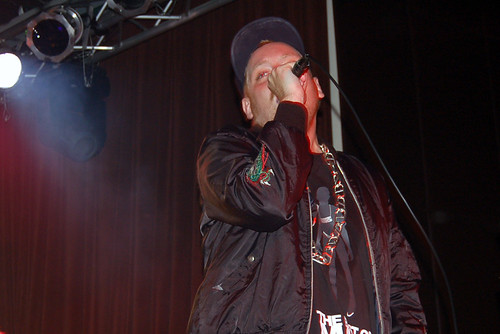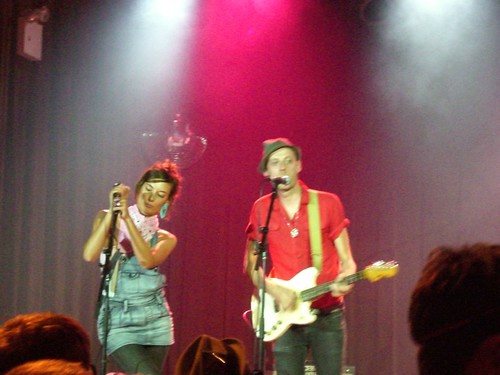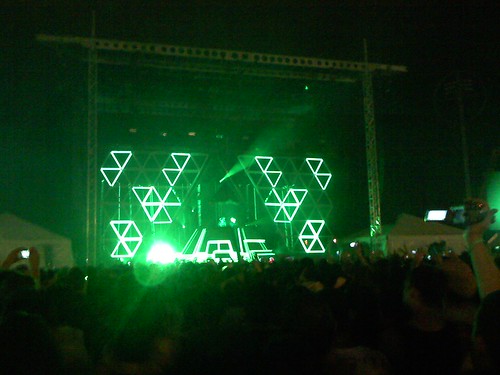The season, and likely the show is over, and if this is the way we go out, I’m pretty satisfied. It’s a finale that resolves some central questions, but leaves us with a lot to talk about in the years to come. If the end of The Sopranos tells us anything, it’s that questions draw more attention than conclusions, and considering so much of the joy of the series is in its mystery, I’m glad we’re left with some things to ponder. I thought I had figured the whole show out last week, but this week left me with some open questions. Still, if you follow the basic thematic template of the season, most of what happened does make sense, and is a perfect thematic wrap up to what we’ve seen over the course of the season.
But, themes and complex ideas aside, the opening of this episode is pure filmic adrenaline, the real climax of the series and an absolutely exhilarating moment. We open in the clouds, music building, then slowly descend onto the water to reveal John and Shaun flying across the water. I really can’t say enough about how incredible that moment was, the entire opening sequence was complete joy and put a huge smile on my face.
From a narrative point of view, last episode was the darkness before this wonderful dawn. It was a test of faith and the three foremost believers: Kai, Butchie and Cass, all passed the test, waiting for John and Shaun to return and being rewarded by the vindication of their faith. This obviously has some Jesus parallels, but unlike Jesus, there seems to be no limit on Shaun and John’s return, their absence was not about suffering themselves, it was more about helping those around them to fully come together and work as a family and community.
Everything is restored and for the first time in a while, the whole family is reunited. Shaun says that it’s time to move out of his grandparents’ house, to be with Butchie and John. At the beginning of the series, Mitch and Cissy were constantly insulting Butchie for his failure to be there for Shaun. This came out most heavily after he didn’t show for the surfing contest where Shaun was injured. Cissy and Mitch take it as a criticism that Shaun would want to leave, but I think it’s more a reflection of Butchie’s growth.
It’s also significant if you view Shaun as part of the healing trinity, with John and Zippy. Butchie claimed that it was only the presence of Shaun that kept Mitch and Cissy from spiraling off the deep end. He was there to heal them, and now that work is done. The rift with his mother is healed and he can move along. Throughout, Shaun has been a healing and unifying force. We see this in his behavior with his mother, always being affectionate and opening the door for her to take a larger role in his life. The character frequently seems passive, but he is instigating a lot with Tina, and that has helped to heal her.
As I mentioned last week, one of the series’ essential themes, and the key to understanding this episode, is the notion that John is there to heal all the characters. They’re all carrying around past sins that have crippled them, and he is the catalyst for events that will allow them to move past the pain and reinvent their lives. In this episode, Cissy finally accepts Tina, and secures her a place in Shaun’s life. This helps her move beyond the guilt she felt for leaving Shaun so many years ago. It was the healing of Shaun that set this possibility in motion back in the second episode.
Concurrent with this, we’ve got the lengthy sequence where Linc interrogates John, and John tries his best to convey his father’s message. This is where things started to get a bit confusing for me, there are elements that I can’t reconcile, and may not be reconcilable with the material we’ve seen. After all, the show has not been cancelled, and Milch has to leave something open for a second season. But, a lot of what he says here does clear things up. The first line of his speech, repeated here, “If my words are yours, can you hear my father?” clicked for me when he said it. It builds on what Butchie and Kai were talking about last week, that he repeats what we say to represent concepts he doesn’t have words for. He uses our words to tell us about his father. That’s a central piece of knowledge to help understand what he’s doing throughout the series.
Much of this dialogue consisted of a revisiting of the speech, explaining some of what he said there. But, things are a bit more ambiguous when you consider what he says may actually mean other things. I’m particularly wondering about what Cass’s camera means. It could obviously refer to her camera, but is there a larger significance? The way I’m seeing it now is that Cass’s camera is a metatextual reference to the filming of the show. So much of the episode was shown from the perspective of her camera, and it was piped into the internet café in a way that was technically impossible.
In the café, Dwayne and Jerri are made into viewers of the exact same action we’re watching on TV. It would make sense to use Dwayne as an audience surrogate, for the viewers who are on the internet trying to figure out what’s going on. If Cass’s camera is the world of the show, then is Dwayne the fanbase surrounding it? Is the internet big because that’s where the show lives on and develops? One could easily interpret ‘his visit’ as a visit to us. Every week, we check in with John and these characters, existing on the fringe of their world, seeing it only through a camera, like Cass does here. She seems to have lost her own self and taken on another persona, something that would be possible once she’s aware that she is creating the world around her through her camera. Notably, all of the things that John said would happen in Cass’s camera in his speech, did happen on the show, in one way or another, supporting the notion that it’s a metatextual reference.
If we read things that way, does it explain who John’s father is? I don’t think Milch is breaking the fourth wall to say that he is the ‘Father’ who gives John words. That would reduce John’s mission to something that’s only relevant in their fictional world. I think the ‘Father’ is God, or at least some pure essence of goodness from which all things flow. John is his messenger, speaking for him without knowing exactly what words to use. The idea of his father having a father is a question you could ask about God, and is not something that’s easy to answer. If you read the scene as John being a messenger from God, then his inability to answer questions makes sense. That’s not something that our words are capable of doing, it’s an idea that’s bigger than any of us.
The greatest ambiguity of the episode for me is the nature of the car dealer. He speaks in the same way as John, using a lot of the same language. The implication is certainly made that this man could be John’s father, which would explain why John took them there to buy the car. The other explanation, and the one that I’d argue makes more sense is the notion that John’s message is spreading. Last week we heard other characters making reference to “big” and “huge” events. This could be symptomatic of a larger change, even people not directly connected to the family are speaking the way John does. During the parade sequence, the groundwork is certainly laid for an expansion of John’s message, and that seems like the most fertile ground for a potential second season.
One of the things I like about the episode is the way that it brings everyone together. Earlier, I assumed that Linc and Tina would pose a threat to Shaun, but it turns out that they, and Jake Ferris, are working in his best interest, just in a different way than the others. Linc’s exploitation of Butchie was the catalyst for all the Yosts’ problems at the start of the show. This is something he makes explicit in his speech. I was wondering why that speech was going on so long, and it wasn’t until after that I realized why. He had not faced up to being the source of so many problems, here he does, and he also hands over the company to John and the Yosts, letting them take control of their own destinies. We finally get that happy family tableau that was first glimpsed during the speech, things aren’t perfect, but they’re ok.
Tracking back a bit, the entire parade sequence was a bit out of nowhere, but fits with the oddness of the show. The best part is Bill’s outrage after he’s arrested while trying to coordinate traffic. The parade serves as a celebration of John’s message, and something of a coming out party for his agenda and the family in general. The critical thing here is the fact that Stinkweed has been turned into an engine for spreading John’s message. His symbol, the line and circle man, seems to be part of something larger. It is his sigil, and through it, he can spread his agenda.
Now, this may be projection, but I feel like the next step in John’s agenda if forming a kind of army to help spread his message. That’s the reason he comes back in fatigues, and also why there are the constant terrorism references when discussing his mission. Cissy continually refers to him as like a terrorist. It would make sense that God would send his own warrior to counter those who kill in his name, only instead of fighting with violence, he fights with love.
I think the show is largely centered around an examination of what it would be like if Jesus came to Earth today, and using that framework, it would make sense John would use a major corporation to spread his message. He converts his disciples, and by putting his logo on everything, he will help to spread the message. Last episode, we saw one stick man becoming two becoming many. That is what Stinkweed will do for John, rather than selling the bad boy image, they will sell the ultimate good.
The one misstep of this episode was the Freddie and Palaka storyline. While I’ve loved the constant character additions, at this point, we really didn’t need a lengthy scene with two people we hadn’t seen before. The storyline took up too much time, and didn’t feel as urgent or exuberant as the rest of the show. But, I do like the resolution, in which Freddie gets out of crime, inspired by the events he’s witnessed over the course of the series. That fits in perfectly with the themes of the series and the journey the character has gone on over the past few episodes.
The final scene of the episode has Bill finally confronting his demons and going upstairs for the first time since his wife’s death. It’s a wonderful scene, no one can do monologues like Ed O’Neil on this show, and it also marks the resolution of his character arc. This great pain he’s carrying around is finally on the way to being healed. His journey is similar to Barry’s, they must confront a space that horrifies them, and when they finally go in there, they realize it’s not so bad, and are free to move on with their lives. The return of Zippy is a wonderful moment, Bill had to prove he could do things without Zippy, and now that he’s succeeded, Zippy can return.
But, there’s still some major things to ponder. In the brief, 16mm style sequence, we get another voiceover from John that’s just baffling. I think the point is to give us a final blast of weird information to keep us pondering. The most odd thing is first, that Dr. Smith goes to Cincinnati and comes back twenty years younger. This raises a question about what Cincinnati is. When he returns from the water, John says that he came back from Cincinnati, and Shaun says that he only remembers what they wanted him to say. The opening sequence, and the logic of the show, suggests that Cincinnati is heaven, where John’s father resides. So, it’s possible that somehow Dr. Smith wound up there and came back younger. Smith was the first person to be dazzled by what happened to Shaun, and it would make sense that he would receive a special reward from John’s father.
The rest of the speech is as follows: “Cissy gets knocked up. She's bigger than Leona Helmsley. Earth puts Dickstein on retainer; Daphne keeps his head straight. Jerri meets a slew of new hairlips. My father forewalls (four walls?)Barry's bar. Dr. Smith trains Dwayne and Ramon. My father freelances in Cass' camera."
I’m not sure what the significance of Cissy gets knocked up is, but Leona Helmsley was renowned for being mean, so it would make sense to associate the character. Perhaps he’s saying that she has moved on and is now “bigger” than Leona, in the sense that she has more important priorities. I couldn’t tell you.
Earth puts Dickstein on retainer would seem to relate to his mindblowing, and just blowing, experience earlier in the episode. Something happened there, which ties back to a comment John made in the pilot about the significance of the lawyer getting a blowjob. So, he has been given a new path, the universe has spoken to him and put him to work. I’m not sure what forewalls, or four walls, means in this context. It’s a place where John’s father seems to have a major influence, but I couldn’t tell you what exactly is going on. Dr. Smith training Dwayne and Ramon would mean that both of them will work to help heal people.
The idea of his father freelancing in Cass’s camera is an interesting one. If we continue the metatextual reading, it’s arguable that his father could be appearing in various guises throughout the series. That would reinforce the idea of the car salesman as John’s father. What is definitely clear is the fact that God is present in various moments of the characters’ lives. That what Dr. Smith and Barry referred to last week, his ‘freelancing’ is what helped them to get the clinic and bar going, the “hallelujah chorus” that Smith referred to.
And what of Mitch’s levitation. I read online that it’s meant to be a metaphor for his distance from his family. It certainly works on that level, John made him to levitate to show how he’s losing touch, and at first, he wants them to leave, not pull him down. But, eventually Butchie and Shaun do, and the family is healed. I love the moment where they’re all united cracking on the guy who yelled at Tina a few episodes ago. I also love the fact that he returned, further tying the community together.
One more lingering enigma is the Chemist. He seems to be in touch with what’s going on, and when he stares out at the stadium thing, he knows that’s where the message is coming from. He’s the only one with the perspective to recognize what’s right in front of them all.
And at last, we come to the initially baffling final moment, a shot of Cass and John’s narration: “Mother of God CassKai.” Now, this is a tough one. John has equated Cass and Kai previously, as has Cass herself. I would argue that the reason he calls them the mother of God is that they are the first two women to follow his teaching. So, they will birth his God out into the world. We previously saw them equated during the end of last week’s episode, where they’re both watching Butchie out in the water, waiting for Shaun. They each have had contact with John and each have “seen God.” They are the people John confides in, and are best able to understand him. Each grow frustrated by him at some point, but ultimately are in awe of his abilities.
This episode shows John taking the first step in spreading his mission to a larger world. He has saved the Yosts, and they shall be his representatives, but the ones who had faith in him from the beginning were Butchie, Shaun, Cass and Kai. They are the core, and that is the reason that CassKai is the mother of God. That said, why is this the end of the show? We’ve spent so much time talking about John’s father, it would be logical to address the mother. Both have seen God, via John, so they shall carry him out into the world. He showed no one else that vision, they are special. And, it is through Cass’s camera that his word is spread out to us, the audience of viewers parallel to their universe.
From here, John will spread his message, and if there is another season, I’d imagine that will be the focus. After all, we are all one larger organism, and more people need to realize that. When they saw God, it was other people, so why not save the entire universe?
Will there be another season? I don’t know, I’d love to see it, but all we can do is hope. If this is the end, it went out on a fantastic note, and I feel satisfied with the ending. All the major plot and character threads are resolved, but the door is open for more. This series has been a masterpiece, leaving me in awe every week, and now that it has wrapped the season, I can confidently say this one of the best pieces of art to ever air on television, and I want to thank everyone involved in making it for bringing something so uniquely powerful to our world.








